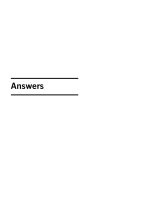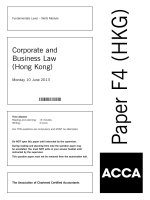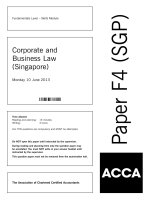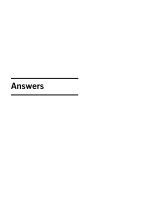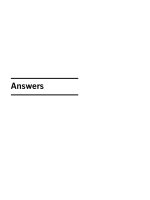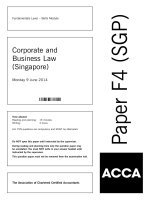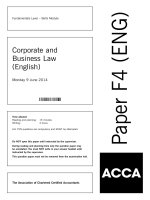ACCA f4 corporate and business law BPP revision kit 2017
Bạn đang xem bản rút gọn của tài liệu. Xem và tải ngay bản đầy đủ của tài liệu tại đây (4.16 MB, 218 trang )
ACCA APPROVED
BPP House
142-144 Uxbridge Road
London W12 8AA
United Kingdom
T 0845 075 1100 (UK)
T +44 (0)20 8740 2211 (Overseas)
E
bpp.com/learningmedia
February 2016
£18.00
• Banks of questions on every syllabus area
• Answers with detailed guidance on approaching
questions
• Three mock exams with full answers and guidance
For exams from 1 September 2016 to 31 August 2017
Contact us
One of a suite of products supporting Paper F4
Corporate and Business Law (English), for use
independently or as part of a package, this Kit is
targeted at ACCA’s exams from 1 September 2016
to 31 August 2017 and contains:
Practice & Revision Kit
Paper F4
Corporate and Business Law (English)
This Kit provides material specifically for the practice
and revision stage of your studies for Paper F4
Corporate and Business Law (English) that has been
comprehensively reviewed by the ACCA examining
team. This unique review ensures that the questions,
solutions and guidance provide the best and most
effective resource for practising and revising for the
exam.
Corporate and Business Law (English)
BPP Learning Media is dedicated to supporting aspiring business professionals
with top-quality learning material as they study for demanding professional
exams, often whilst working full time. BPP Learning Media’s commitment
to student success is shown by our record of quality, innovation and market
leadership in paper-based and e-learning materials. BPP Learning Media’s study
materials are written by professionally qualified specialists who know from
personal experience the importance of top-quality materials for exam success.
ACCA F4
ACCA approved content provider
A-PDF Text
Replace
DEMO: Purchase from www.A-PDF.com to remove the watermark
CONTENT
PROVIDER
ACCA Approved
Practice & Revision Kit
Paper F4
Corporate and Business Law
(English)
Free access
to our Exam
Success site
Look inside
For exams from 1 September 2016
to 31 August 2017
/>
ACF4(ENG)RK16 (HO).indd 1-3
18/02/2016 10:42
ACCA APPROVED CONTENT PROVIDER
As the first accredited publisher of ACCA materials, BPP Learning Media has set the benchmark for
producing exceptional study materials for students and tutors alike.
Our Study Texts, Practice & Revision Kits and i-Passes (for exams on demand) are reviewed by the ACCA
examining team and are written by our in-house authors with industry and teaching experience who
understand what is required for exam success.
EXAM SUCCESS SITE
To help maximise your chances of succeeding in your exams, we’ve put together a suite of exclusive ACCA
resources. Our Exam Success site provides you with access to a free digital version of this publication, as
well as extra resources designed to focus your efforts on exams and study methods.
To access the Exam Success site, please email with the subject line “Access to Exam
Success site - eBook”, including your order reference number and the name of the book you’ve bought (ie
ACCA F5 Study Text) for your access code. Once you have received your code, please follow the instructions
below:
To access the BPP ACCA Exam Success site for this material
please go to:
www.bpp.com/ExamSuccessSite
n Create a user account if you don’t already have one.
Make sure you reply to the confirmation email.
n Log in using your registered username and password.
Select the paper you wish to access.
n Enter the code you received when prompted. You will only
have to do this once for each paper you are studying.
/>
P
R
A
C
T
I
C
E
PAPER F4
CORPORATE AND BUSINESS LAW
(ENG)
BPP Learning Media is an ACCA Approved Content Provider for the ACCA qualification.
This means we work closely with ACCA to ensure our products fully prepare you for your
ACCA exams.
In this Practice & Revision Kit, which has been reviewed by the ACCA examination
team, we:
Discuss the best strategies for revising and taking your ACCA exams
Ensure you are well prepared for your exam
Provide you with lots of great guidance on tackling questions
Provide you with three mock exams
Provide ACCA exam answers as well as our own for selected questions
Our Passcards also support this paper.
FOR EXAMS FROM 1 SEPTEMBER 2016 TO 31 AUGUST 2017
/>
&
R
E
V
I
S
I
O
N
K
I
T
First edition 2008
A note about copyright
Ninth edition February 2016
Dear Customer
What does the little © mean and why does it matter?
ISBN 9781 4727 4435 7
(previous ISBN 9781 4727 2686 5)
Your market-leading BPP books, course materials and e-learning
materials do not write and update themselves. People write them on
their own behalf or as employees of an organisation that invests in
this activity. Copyright law protects their livelihoods. It does so by
creating rights over the use of the content.
e-ISBN 9781 4727 4650 4
British Library Cataloguing-in-Publication Data
A catalogue record for this book
is available from the British Library
Breach of copyright is a form of theft – as well as being a criminal
offence in some jurisdictions, it is potentially a serious breach of
professional ethics.
Published by
With current technology, things might seem a bit hazy but, basically,
without the express permission of BPP Learning Media:
BPP Learning Media Ltd
BPP House, Aldine Place
London W12 8AA
www.bpp.com/learningmedia
Printed in the United Kingdom by RICOH UK Limited
Unit 2
Wells Place
Merstham
RH1 3LG
Photocopying our materials is a breach of copyright
Scanning, ripcasting or conversion of our digital materials
into different file formats, uploading them to Facebook or emailing them to your friends is a breach of copyright
You can, of course, sell your books, in the form in which you have
bought them – once you have finished with them. (Is this fair to your
fellow students? We update for a reason.) Please note the e-products
are sold on a single user licence basis: we do not supply 'unlock'
codes to people who have bought them secondhand.
Your learning materials, published by BPP Learning Media Ltd, are
printed on paper obtained from traceable sustainable sources.
All rights reserved. No part of this publication may be reproduced,
stored in a retrieval system or transmitted in any form or by any
means, electronic, mechanical, photocopying, recording or
otherwise, without the prior written permission of BPP Learning
Media.
And what about outside the UK? BPP Learning Media strives to make
our materials available at prices students can afford by local printing
arrangements, pricing policies and partnerships which are clearly
listed on our website. A tiny minority ignore this and indulge in
criminal activity by illegally photocopying our material or supporting
organisations that do. If they act illegally and unethically in one area,
can you really trust them?
The contents of this book are intended as a guide and not
professional advice. Although every effort has been made to ensure
that the contents of this book are correct at the time of going to
press, BPP Learning Media makes no warranty that the information
in this book is accurate or complete and accept no liability for any
loss or damage suffered by any person acting or refraining from
acting as a result of the material in this book.
We are grateful to the Association of Chartered Certified
Accountants for permission to reproduce past examination
questions. The suggested solutions in the Practice & Revision Kit
have been prepared by BPP Learning Media Ltd, except where
otherwise stated.
©
BPP Learning Media Ltd
2016
ii
/>
Contents
Page
Finding questions
Question index ................................................................................................................................................................. iv
Helping you with your revision ..................................................................................................................... vi
Revising F4
Topics to revise................................................................................................................................................................ vi
Passing the F4 exam ...................................................................................................................................................... viii
Exam information ............................................................................................................................................................. xi
Useful websites ................................................................................................................................................................ xi
Questions and answers
Questions..........................................................................................................................................................................3
Answers ..........................................................................................................................................................................85
Exam practice
Mock exam 1
Questions......................................................................................................................................................................135
Answers ........................................................................................................................................................................147
Mock exam 2
Questions......................................................................................................................................................................155
Answers ........................................................................................................................................................................167
Mock exam 3 (December 2014)
Questions......................................................................................................................................................................175
Answers ........................................................................................................................................................................185
ACCA's exam answers
December 2014.............................................................................................................................................................195
Review Form
iii
/>
Question index
The headings in this checklist/index indicate the main topics of questions. Multiple Task Questions (MTQs) will
cover material within the relevant part of the syllabus.
Time
Page number
Marks
allocation
Mins
Question
Answer
1 Law and the legal system
23
28
3
85
2 Sources of law
23
28
5
86
3 Formation of contract I
23
28
7
87
4 Formation of contract II
23
28
9
88
5 Content of contracts
23
28
12
90
6 Breach of contract and remedies
23
28
14
91
7 The law of torts and professional negligence
23
28
17
92
8 MTQ Bank 1
30
36
20
94
9 Contract of employment
23
28
22
96
10 Dismissal and redundancy
23
28
24
97
11 MTQ Bank 2
30
36
27
99
12 Agency law
23
28
29
101
13 Partnerships
23
28
31
102
14 Corporations and legal personality
23
28
34
103
15 Company formation
23
28
36
104
16 Constitution of a company
23
28
38
105
17 MTQ Bank 3
30
36
41
107
18 Share capital
23
28
43
109
19 Loan capital
23
28
46
110
20 Capital maintenance and dividend law
23
28
49
111
21 MTQ Bank 4
30
36
52
112
Part A: Essential elements of the legal system
Part B: The law of obligations
Part C: Employment law
Part D: The formation and constitution of business
organisations
Part E: Capital and the financing of companies
iv
Question index
/>
Time
Page number
Marks
allocation
Mins
Question
Answer
22 Company directors
23
28
54
114
23 Other company officers
23
28
56
115
24 Company meetings and resolutions
23
28
58
116
25 MTQ Bank 5
30
36
60
117
26 Insolvency and administration
23
28
62
119
27 MTQ Bank 6
30
36
65
120
28 Fraudulent and criminal behaviour
23
28
67
122
29 MTQ Bank 7
30
36
70
123
30 Mixed Multiple Choice Questions 1 (Specimen Paper)
22
27
72
125
31 Mixed Multiple Choice Questions 2 (Specimen Paper)
22
27
75
126
32 Mixed Multiple Choice Questions 3 (Specimen Paper)
26
32
78
127
33 Mixed Multiple Task Questions 1 (Specimen Paper)
30
36
81
128
Mock Exam 1
100
120
135
147
Mock Exam 2
100
120
155
167
Mock Exam 3 (December 2014 exam)
100
120
175
185
Part F: Management, administration and the
regulation of companies
Part G: Insolvency law
Part H: Corporate fraudulent and criminal behaviour
Mixed Question Banks
Mock Exams
Question index
/>
v
Helping you with your revision
BPP Learning Media – ACCA Approved Content Provider
As an ACCA Approved Content Provider, BPP Learning Media gives you the opportunity to use revision materials
reviewed by the ACCA examination team . By incorporating the ACCA examination team’s comments and
suggestions regarding the depth and breadth of syllabus coverage, the BPP Learning Media Practice & Revision Kit
provides excellent, ACCA-approved support for your revision.
Tackling revision and the exam
Using feedback obtained from the ACCA examination team review:
We look at the dos and don’ts of revising for, and taking, ACCA exams
We focus on Paper F4; we discuss revising the syllabus, what to do (and what not to do) in the exam, how to
approach different types of question and ways of obtaining easy marks
Selecting questions
We provide signposts to help you plan your revision.
A full question index
Making the most of question practice
At BPP Learning Media we realise that you need more than just questions and model answers to get the most from
your question practice.
Our top tips included for certain questions provide essential advice on tackling questions, presenting
answers and the key points that answers need to include.
In a bank at the end of this Kit we include the official ACCA answers to the December 2014 exam. Used in
conjunction with our answers they provide an indication of all possible points that could be made, issues
that could be covered and approaches to adopt.
Attempting mock exams
There are three mock exams that provide practice at coping with the pressures of the exam day. We strongly
recommend that you attempt them under exam conditions. Mock exams 1 and 2 reflect the question styles and
syllabus coverage of the exam; Mock exam 3 is the December 2014 exam paper.
Revising F4
Topics to revise
All questions are compulsory so you must revise the whole syllabus. Since the exam includes 45 multiple choice
questions in Section A, you should expect questions to cover a large part of the syllabus. Selective revision will
limit the number of questions you can answer and hence reduce your chances of passing. It is better to go into the
exam knowing a reasonable amount about most of the syllabus rather than concentrating on a few topics to the
exclusion of the rest.
vi
Helping you with your revision
/>
Question practice
Practising as many exam-style questions as possible will be the key to passing this exam. You must do questions
under timed conditions.
Avoid looking at the answers until you have finished a question bank. Your biggest problem with the MTQ questions
may be knowing how to start, and this needs practice.
Also ensure that you attempt all three mock exams under exam conditions.
Helping you with your revision
/>
vii
Passing the F4 exam
Displaying the right qualities
You will be required to identify the requirements of multiple choice questions quickly, so that you can make
your answers confidently within the available time
You will be required to interpret scenarios and apply your knowledge to them
You must therefore be able to apply your skills in a practical context
Avoiding weaknesses
There is no choice in this paper, all questions have to be answered. You must therefore study the entire
syllabus, there are no short-cuts.
The ability to answer multiple choice questions improves with practice. Try to get as much practice with
these questions as you can.
The multiple task questions (MTQs) will be based on simple scenarios and answers must be focused and
specific to the situation.
Attempt all parts of the MTQs. Even if you cannot answer them in full, you can still gain some marks.
Gaining the easy marks
Some MCQs are easier than others and will take less time to process. Answer those that you feel fairly confident
about as quickly as you can. Come back later to those you find more difficult. This could be a way of making use of
the time in the examination most efficiently and effectively. Many MCQs will not involve calculations. Make sure that
you understand the wording of MCQs before selecting your answer.
viii
Passing F4
/>
The Computer Based Examination
Computer based examinations (CBEs) are available for the English and Global variants of the F4 exam in addition to
the conventional paper based examination.
Computer based examinations must be taken at an ACCA CBE Licensed Centre.
How does CBE work?
Questions are displayed on a monitor
Candidates enter their answer directly onto the computer
Candidates have two hours to complete the examination
When the candidate has completed their examination, the final percentage score is calculated and displayed
on screen
Candidates are provided with a Provisional Result Notification showing their results before leaving the
examination room
The CBE Licensed Centre uploads the results to the ACCA (as proof of the candidate's performance) within
72 hours
Candidates can check their exam status on the ACCA website by logging into myACCA.
Benefits
Flexibility as a CBE can be sat at any time.
Resits can also be taken at any time and there is no restriction on the number of times a candidate can sit a
CBE.
Instant feedback as the computer displays the results at the end of the CBE.
Results are notified to ACCA within 72 hours.
CBE question types
Multiple choice – choose one answer from three or four options
Multiple response – select one or more responses by clicking the appropriate tick boxes
Multiple response matching – select a response to a number of related part questions by choosing one
option from a selection
The Computer Based Examination
/>
ix
Tackling Multiple Choice Questions
The MCQs in your exam contain three or four possible answers. You have to choose the option that best answers
the question. The incorrect options are called distracters. There is a skill in answering MCQs quickly and correctly.
By practising MCQs you can develop this skill, giving you a better chance of passing the exam.
You may wish to follow the approach outlined below, or you may prefer to adapt it.
Step 1
Skim read all the MCQs and identify what appear to be the easier questions.
Step 2
Attempt each question – starting with the easier questions identified in Step 1. Read the
question thoroughly. You may prefer to work out the answer before looking at the options, or you
may prefer to look at the options at the beginning. Adopt the method that works best for you.
Step 3
Read the four options and see if one matches your own answer.
Step 4
You may find that none of the options matches your answer.
Re-read the question to ensure that you understand it and are answering the requirement
Eliminate any obviously wrong answers
Consider which of the remaining answers is the most likely to be correct and select the
option
Step 5
If you are still unsure make a note and continue to the next question
Step 6
Revisit unanswered questions. When you come back to a question after a break you often find
you are able to answer it correctly straight away. If you are still unsure have a guess. You are not
penalised for incorrect answers, so never leave a question unanswered!
After extensive practice and revision of MCQs, you may find that you recognise a question when you sit the exam.
Be aware that the detail and/or requirement may be different. If the question seems familiar read the requirement
and options carefully – do not assume that it is identical.
x
Tackling Multiple Choice Questions
/>
Exam information
Format of the exam
All questions are compulsory.
45 multiple choice questions in Section A, each worth 1 or 2 marks. A total of 70 marks are available.
5 multiple task questions in Section B, each worth 6 marks. A total of 30 marks are available.
Time allowed: 2 hours
Additional information
The Study Guide provides more detailed guidance on the syllabus.
Useful websites
The websites below provide additional sources of information of relevance to your studies of Corporate and
Business Law.
www.accaglobal.com
ACCA's website. The students' section of the website is invaluable for detailed information about the
qualification, past issues of Student Accountant (including technical articles) and a free downloadable
Student Planner App.
www.bpp.com
Our website provides information about BPP products and services, with a link to the ACCA website.
www.ft.com
This website provides information about current international business. You can search for information and
articles on specific industry groups as well as individual companies.
www.iclr.co.uk
The Incorporated Council of Law Reporting
www.lawrights.co.uk
Source of free legal information
www.lawsociety.org.uk
Law Society
www.bbc.co.uk
The website of the BBC carries general business information as well as programme-related content.
Exam information
/>
xi
xii
/>
Questions
1
/>
2
/>
1 Law and the legal system
1.1
Which of the following is the prosecutor in a criminal law case?
A
B
C
1.2
The County Court
The Magistrate's Court
The Crown Court
(1 mark)
Crown Court
Supreme Court
High Court
(1 mark)
The case is decided by the Magistrate rather than a jury
Only criminal cases are heard at a Magistrate's Court
Appeals are made directly to the Court of Appeal
(1 mark)
An indictable offence
A summary offence
A 'triable either way' offence
(1 mark)
Which type of law is concerned with the function and operation of local authorities?
A
B
C
D
1.9
(1 mark)
Which of the following offences would only be heard at a Magistrate's Court?
A
B
C
1.8
A fine
Imprisonment
Damages
Which of the following statements concerning cases brought before a Magistrate's Courts is correct?
A
B
C
1.7
(1 mark)
The Queen's Bench, Family and Chancery are all division of which court?
A
B
C
1.6
Beyond reasonable doubt
Balance of probability
Beyond all probability
All criminal law cases begin in which of the following courts?
A
B
C
1.5
(1 mark)
Which of the following is a remedy available under the civil law?
A
B
C
1.4
The State
The accused
The victim
Which of the following describes the standard of proof in a civil law case?
A
B
C
1.3
28 mins
Public Law
Private Law
Common Law
Equity
(2 marks)
Which two of the following terms are associated with criminal law rather than civil law?
(1)
(2)
(3)
(4)
Punishment
Public law
Compensation
Claimant
A
B
C
D
1 and 2
1 and 4
2 and 3
3 and 4
(2 marks)
Questions
/>
3
1.10
1.11
Which two of the following are the parties involved in a civil law case?
(1)
(2)
(3)
(4)
Accused
Defendant
Claimant
Prosecution
A
B
C
D
1 and 4
1 and 3
2 and 3
2 and 4
(2 marks)
In the civil law system, cases are allocated to one of three 'tracks' for processing.
Which of the following is not a 'track' in the civil law system?
A
B
C
D
1.12
(2 marks)
The County Court
The Magistrate's Court
The Court of Appeal
The Privy Council
(2 marks)
The Chancery Division of the High Court hears cases involving which of the following matters?
A
B
C
D
1.15
The County Court
The Crown Court
The Court of Appeal
The Supreme Court
Which of the following courts only has civil jurisdiction?
A
B
C
D
1.14
(2 marks)
In the criminal law system, an immediate appeal regarding a decision by a Magistrate's Court could be heard
by which of the following courts?
A
B
C
D
1.13
Fast
Medium
Small
Multi
Contract law
Trusts and mortgages
Matrimonial cases
Adoption of children
(2 marks)
Which two of the following are types of offences heard by a Magistrate's Court?
(1)
(2)
(3)
(4)
Indictable
Summary
Triable either way
Hybrid
A
B
C
D
1 and 3
1 and 4
2 and 3
2 and 4
(2 marks)
(Total = 23 marks)
4
Questions
/>
2 Sources of law
2.1
Which of the following is a statement by a judge that is the basis for their decision and is what becomes
binding on future judges?
A
B
C
2.2
Enabling
Public
Private
(1 mark)
Golden rule
Mischief rule
Contextual rule
(1 mark)
Hansard
The long title of the Act
Law commission reports
(1 mark)
Supreme Court
European Court of Human Rights
European Court of Justice
(1 mark)
The decisions of which of the following courts is binding on the Court of Appeal?
A
B
C
D
2.9
(1 mark)
Which of the following is the final appeal court for human rights issues for persons living in the UK?
A
B
C
2.8
Legislation may modify or replace existing statutes
Legislation may not overrule or modify existing case law
Legislation may prevent a subsequent Parliament from changing the law
Which of the following is an intrinsic aid to statutory interpretation?
A
B
C
2.7
(1 mark)
Which rule of statutory interpretation states that words in a statute should be given their plain, ordinary
meaning unless this would give rise to a manifest absurdity or inconsistency with the rest of the statute?
A
B
C
2.6
Reversing
Overruling
Distinguishing
Which of the following types of legislation affects specific individuals or groups?
A
B
C
2.5
(1 mark)
Which of the following statements in relation to legislation is correct?
A
B
C
2.4
Obiter dicta
Per incuriam
Ratio decidendi
Which of the following types of court decision occurs when a court higher in the hierarchy overturns the
verdict of a lower court in the same case?
A
B
C
2.3
28 mins
The County Court
The Crown Court
The High Court
The Court of Appeal
(2 marks)
Which of the following statements concerning the principle of binding precedent is not correct?
A
B
C
D
Mistakes by judges are eliminated
General legal principles are established
The law is based on actual, rather than theoretical, cases
The law is flexible and can develop with changing circumstances
(2 marks)
Questions
/>
5
2.10
2.11
Which two of the following are stages that a Bill passes through before becoming legislation?
(1)
(2)
(3)
(4)
Report stage
Committee stage
Fourth reading
Approval stage
A
B
C
D
1 and 2
1 and 3
2 and 3
2 and 4
(2 marks)
Some statutory instruments require a resolution of Parliament to come into effect, but others must be laid
before Parliament for a particular period of time before coming in effect.
How many days must statutory instruments be laid before Parliament before coming into effect?
A
B
C
D
2.12
(2 marks)
Which rule or approach to statutory interpretation considers what the legislation is trying to achieve?
A
B
C
D
2.13
10
20
30
40
Contextual rule
Literal rule
Purposive approach
Golden rule
(2 marks)
Presumptions of statutory interpretation provide judges with rules to use when interpreting legislation.
Which of the following statements in relation to the presumptions of statutory interpretation is correct?
A
B
C
D
2.14
(2 marks)
Which of the following is an extrinsic aid to statutory interpretation?
A
B
C
D
2.15
A statute may not deprive a person of their property
A statute does not have retrospective effect
A statute binds the Crown
A statute has effect outside the UK
Hansard
The long title of the Act
The preamble of the Act
Side notes to the statute
(2 marks)
Which two of the following statements in relation to the impact of the Human Rights Act 1998 on legislation
are correct?
(1)
(2)
(3)
(4)
A
B
C
D
All new primary legislation must be compatible with the European Convention on Human Rights
The courts may strike out secondary legislation that is incompatible with the European
Convention on Human Rights
Courts must interpret legislation in such a way that is compatible with the European Convention
on Human Rights
Under the Human Rights Act 1998, courts are not required to take the decisions of the European
Court of Justice when making their decisions
1 and 3
1 and 4
2 and 3
2 and 4
(2 marks)
(Total = 23 marks)
6
Questions
/>
3 Formation of contract I
3.1
Which of the following contracts must be in the form of a deed?
A
B
C
3.2
1 day
1 month
For a reasonable time
(1 mark)
Posting a letter of revocation
A request for information
Death of the offeree
(1 mark)
The offeree's express words
The offeree's conduct
Silence of the offeree
(1 mark)
Acceptance is effective once the letter of acceptance is written
Acceptance is effective once the letter of acceptance is posted
Acceptance is effective once the letter of acceptance is delivered
(1 mark)
Which of the following is an example of a standard form contract?
A
B
C
D
3.9
(1 mark)
Which of the following statements regarding the postal rule is correct?
A
B
C
3.8
When the auctioneer presents the goods being sold
When a bid is made
When the auctioneer's hammer falls
Which of the following is not a valid method of acceptance?
A
B
C
3.7
(1 mark)
Which of the following will terminate an offer?
A
B
C
3.6
A statement of possible terms
Displaying goods for sale in a supermarket
A verbal promise to be bound on specific terms
In relation to contract law, how long will an offer remain open if no time period is set for its expiry?
A
B
C
3.5
(1 mark)
In a sale by auction that is stated to be 'without reserve', at which point is an offer made?
A
B
C
3.4
A conveyance (a transfer of a legal estate in land)
A transfer of shares
A consumer credit contract
In relation to contract law, which of the following describes an offer?
A
B
C
3.3
28 mins
A verbal agreement between two private individuals
A contract for the sale of a house between two private individuals
A contract for the supply of electricity between a utility company and a private individual
A contract of employment between a private individual and a small local shop
(2 marks)
Which of the following statements concerning the law and contracts is correct?
A
B
C
D
The law seeks to ensure equal bargaining power between parties
The law will only interfere in contracts where one party abuses a stronger bargaining position
The law does not interfere in the formation of contracts
The law seeks to maintain the bargaining power of parties in a contract
(2 marks)
Questions
/>
7
3.10
Which two of the following are examples of valid offers?
(1)
3.11
(2)
(3)
(4)
A person verbally stating to another person that they would like to sell their computer to them for
£500 today
A newspaper advert that states a shop is selling shoes for £20
A person handing their shopping to a supermarket checkout operator
A business that circulates its price list to customers
A
B
C
D
1 and 2
1 and 3
2 and 3
2 and 4
Which of the following is an example of a valid offer?
A
B
C
D
3.12
When a letter of revocation is posted
When a third party, who is sufficiently reliable, verbally notifies the offeror of the offeree's revocation
When an offeree enquires whether the offeror will accept payment by credit card rather than cash
When an offeror dies, the offeree is unaware of the death and the contract is not of a personal nature
(2 marks)
Which of the following would be regarded as valid, binding acceptance?
A
B
C
D
3.15
Counter-offers may be accepted by the original offeror
Counter-offers do not terminate the original offer
A statement that enquires whether alternative terms would be acceptable is a counter-offer
A counter-offer is made by the original offeror to the original offeree
(2 marks)
In which of the following situations will an offer be terminated?
A
B
C
D
3.14
A display of goods for sale
An Internet shop that advertises products for sale
A newspaper advert that includes a specific statement, made to the world at large, offering a reward
for the return of a particular item
An invitation for potential suppliers to tender for the provision of services
(2 marks)
Which of the following statements regarding counter-offers is correct?
A
B
C
D
3.13
(2 marks)
A counter-offer
Acceptance 'subject to contract'
A tender to perform one task
Posting a letter of acceptance
(2 marks)
Which two of the following statements regarding acceptance of an offer are correct?
(1)
(2)
(3)
(4)
A
B
C
D
Acceptance does not need to be communicated in a unilateral contract
If two identical offers between two parties cross in the post, then one will be regarded as acceptance
of the other
Under the postal rule, a letter of acceptance that has been posted does not have to be received by the
offeror to be valid acceptance
If no method of communicating acceptance is stated in the offer, then acceptance must be made by
post
1 and 2
1 and 3
2 and 3
2 and 4
(2 marks)
(Total = 23 marks)
8
Questions
/>
4 Formation of contract II
4.1
Which of the following is executed consideration?
A
B
C
4.2
Third parties to a contract generally have enforceable rights under it
Only parties to a contract generally have enforceable rights under it
Privity of contract only relates to rights under a contract, not obligations
(1 mark)
A third party to a contract can sue for losses they incur under a contract if the losses are foreseeable
A third party to a contract can bring an action under it if an implied trust has been created
A third party to a contract can enforce rights under it if it is equitable for them to do so
(1 mark)
Social arrangements are generally intended to be legally binding
Commercial arrangements are generally not intended to be legally binding
A contract will be legally binding if both parties intended it to be so
(1 mark)
A letter of comfort
An agreement between a husband and wife to transfer property between them
An agreement 'binding in honour only'
(1 mark)
Which of the following is a correct rule for valid consideration?
A
B
C
D
4.9
(1 mark)
Which of the following indicates that the parties intend to be legally bound?
A
B
C
4.8
Consideration does not need to have a value to be sufficient
Consideration is sufficient if it has some economic value
Consideration does not need to be sufficient but must be adequate
Which of the following statements regarding intention to create legal relations is correct?
A
B
C
4.7
(1 mark)
Which of the following is not an exception to the rule of privity of contract?
A
B
C
4.6
Courts will seek to ensure that consideration from each party is of equal value
Courts will seek to ensure no party makes excess profit
Courts will not interfere in a contract to rectify a bad bargain
Which of the following is true regarding privity of contract?
A
B
C
4.5
(1 mark)
Which of the following statements regarding the adequacy and sufficiency of consideration is correct?
A
B
C
4.4
Providing goods in return for payment at the same time
A promise of payment in return for the provision of goods at a later date
A promise to pay for work already carried out
Which of the following describes how courts deal with the adequacy of consideration?
A
B
C
4.3
28 mins
Consideration must pass from the promisee
Consideration must be adequate
Past consideration is generally valid consideration
Executory consideration is generally not valid consideration
(2 marks)
Which of the following statements is true of consideration?
A
B
C
D
Past consideration is sufficient to create liability on a bill of exchange
Suffering some loss or detriment is not valid consideration
Consideration can be in the form of any act, even if that act is impossible to perform
Performance of an illegal act is valid consideration
(2 marks)
Questions
/>
9
4.10
Where a party accepts part payment for a debt, they may at a later date request payment of the amount
outstanding unless the other party provided extra consideration when making the part payment.
Which two of the following are valid extra consideration for part payment of a debt?
4.11
(1)
(2)
(3)
(4)
Payment in the form of goods rather than cash
Payment by a third party rather than the debtor
An intention by the debtor to be legally bound by the part payment
A guarantee by the debtor to make the payment on the date agreed in the contract
A
B
C
D
1 and 2
1 and 4
2 and 3
2 and 4
Which of the following statements regarding consideration is correct?
A
B
C
D
4.12
Performance of an existing legal obligation is valid consideration for the promise of additional reward
Performance of an existing contractual duty is sufficient consideration for the promise of additional
reward
Performance of an existing contractual duty to a third party is sufficient consideration for the promise
of additional reward
Performance of an extra service in addition to an existing contractual duty is not sufficient
consideration for the promise of additional reward
(2 marks)
Which of the following statements concerning privity of contract is correct?
A
B
C
D
4.13
(2 marks)
Privity of contract means only parties to a contract may sue on it
Privity of contract is not subject to regulation by statute
There are no exceptions to the rule of privity of contract
Privity of contract is only enforceable on commercial contracts
(2 marks)
The Contracts (Rights of Third Parties) Act 1999 sets out the circumstances where a third party has a right
to enforce rights they may have under a contract.
Which of the following statements concerning the Contracts (Rights of Third Parties) Act 1999 is correct?
A
B
C
D
4.14
(2 marks)
Which of the following is true regarding presumptions of intention to create legal relations?
A
B
C
D
10
The third party need not be expressly identified in the contract
The third party need not be in existence when the contract was formed
The Act confers rights to third parties under a company's constitution
The Act confers rights to third parties under employment contracts
Parties in social, domestic and family agreements never intend to be legally bound
Parties in commercial agreements never intend to be legally bound
The presumption in all agreements is that the parties intend to be legally bound
Any presumptions in regards to the intention of parties to be legally bound may be refuted and the
burden of proof is on the party seeking to escape liability
(2 marks)
Questions
/>
4.15
Which two of the following social, domestic and family contracts would be presumed by the courts as
intended to be legally binding?
(1)
(4)
An agreement where a father offers to pay his daughter a monthly allowance if she continues her
education
An agreement between friends to enter a newspaper competition together and share any prizes
between them
An agreement between a husband and wife who have separated for one to rent the family home from
the other
An agreement by a son to pay his mother housekeeping money while he stays at home
A
B
C
D
1 and 3
1 and 4
2 and 3
2 and 4
(2)
(3)
(2 marks)
(Total = 23 marks)
Questions
/>
11


